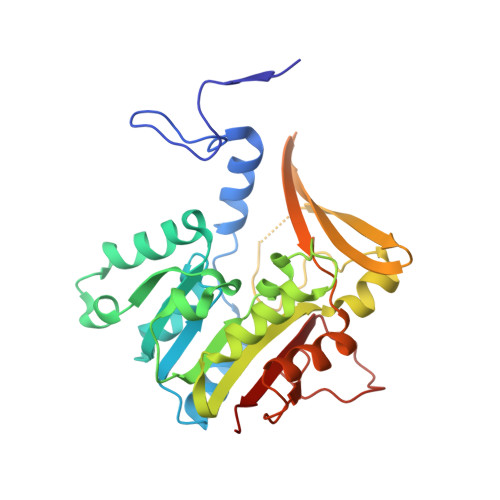5-methyltetrahydrofolate is bound in intersubunit areas of rat liver folate-binding protein glycine N-methyltransferase.
Luka, Z., Pakhomova, S., Loukachevitch, L.V., Egli, M., Newcomer, M.E., Wagner, C.(2007) J Biol Chem 282: 4069-4075
- PubMed: 17158459
- DOI: https://doi.org/10.1074/jbc.M610384200
- Primary Citation of Related Structures:
2IDJ, 2IDK - PubMed Abstract:
Glycine N-methyltransferase (GNMT) is a key regulatory enzyme in methyl group metabolism. It is abundant in the liver, where it uses excess S-adenosylmethionine (AdoMet) to methylate glycine to N-methylglycine (sarcosine) and produces S-adenosylhomocysteine (AdoHcy), thereby controlling the methylating potential of the cell. GNMT also links utilization of preformed methyl groups, in the form of methionine, to their de novo synthesis, because it is inhibited by a specific form of folate, 5-methyltetrahydrofolate. Although the structure of the enzyme has been elucidated by x-ray crystallography of the apoenzyme and in the presence of the substrate, the location of the folate inhibitor in the tetrameric structure has not been identified. We report here for the first time the crystal structure of rat GNMT complexed with 5-methyltetrahydrofolate. In the GNMT-folate complex, two folate binding sites were located in the intersubunit areas of the tetramer. Each folate binding site is formed primarily by two 1-7 N-terminal regions of one pair of subunits and two 205-218 regions of the other pair of subunits. Both the pteridine and p-aminobenzoyl rings are located in the hydrophobic cavities formed by Tyr5, Leu207, and Met215 residues of all subunits. Binding experiments in solution also confirm that one GNMT tetramer binds two folate molecules. For the enzymatic reaction to take place, the N-terminal fragments of GNMT must have a significant degree of conformational freedom to provide access to the active sites. The presence of the folate in this position provides a mechanism for its inhibition.
Organizational Affiliation:
Department of Biochemistry, Vanderbilt University School of Medicine, Nashville, Tennessee 37232, USA.















